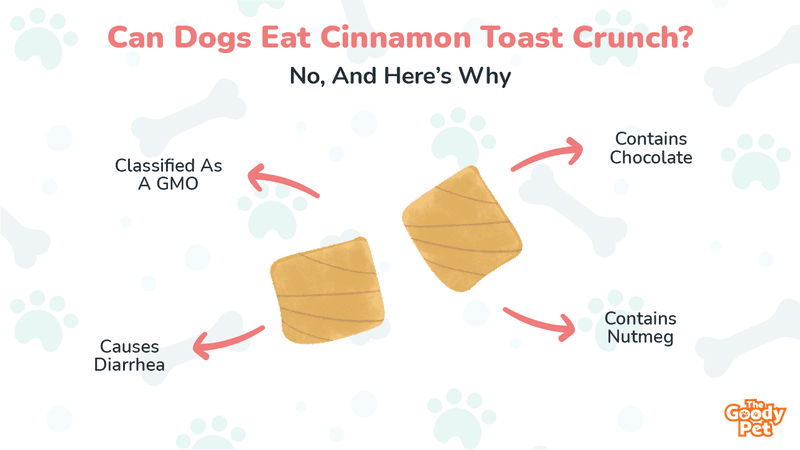Dog owners often question if cinnamon is as good for their dogs as it is for humans. Dogs will love the inviting flavors and sweet taste of this spice. However, you should know every detail about the cereal before deciding whether it is ideal for your dog or not. So, is Cinnamon Toast Crunch good for your dog?
Cinnamon Toast Crunch is not something we advocate giving your dog. Even if it is tasty, this cereal is not worth feeding your dog. It is devoid of nutritional value and contains harmful substances, such as nutmeg. A fair bit of Cinnamon Toast Crunch is unlikely to make your dog sick, but there is no reason to feed it in the first place.
Cinnamon, like other spices and sweeteners, creates a potent flavor that is nearly impossible to resist! Just ask anyone who has ever been faced with a piece of cinnamon toast. This article explains why you should avoid this sweet crunch for your pooch.
To begin with, we’re answering a common question about Cinnamon Toast Crunch in the next section. Read on to find out more.
Is Cinnamon Toast Crunch A GMO?
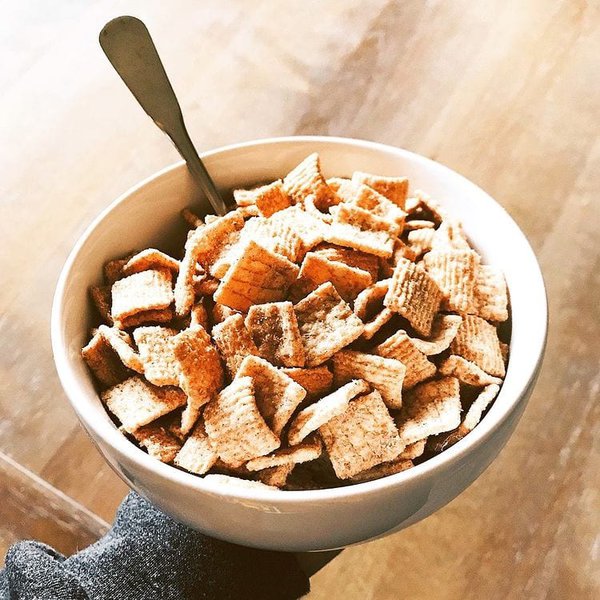
Cinnamon Toast Crunch is classified GMO because elements like canola oil and BHT are heavily present.
What Is A GMO? Is It Vegan?
The term GMO simply refers to a genetically modified organism. Plant and animal breeders have attempted to tweak the genes of living things for a long time by selectively breeding the most effective organisms. This is a type of genetic engineering.
On the other hand, GMOs usually refer to altering the genes of organisms in a laboratory setting. GMO product makers, particularly food producers, genetically edit organisms to improve the product or gain a competitive edge.
However, even though GMOs do not contain animal products, the manufacturing process is not without cruelty or exploitation as most times, the products are tested on different animals for confirmation.
Why Is Cinnamon A GMO?
The Cinnamon Toast Crunch Cereal box screams, “real cinnamon and sugar in every bite!” What does this imply about the other elements’ legitimacy and authenticity? If you look closely, you’ll discover canola oil, food coloring, and BHT food preservatives.
Canola oil is heavily processed and most certainly contains cancer-causing GMOs. Allergies and some cancer types have been linked to artificial coloring. BHT is a harmful preservative, and its use has been outlawed in several nations. BHT has been found in several studies to build in the body over time, causing cancer and liver damage.
Can GMO Hurt Dogs?
Many independent scientists are skeptical of GMOs’ safety. Although the US government has approved GMOs, many other countries have banned them. GMO crops were banned in 38 countries worldwide, including 28 in Europe, by 2015.
Even if you give your dog a handmade raw diet, chances of it getting GMOs are high unless you’re taking deliberate steps to avoid them in its food. GMO elements in both dog and human nutrition are becoming increasingly untrustworthy, according to dog owners.
Can I Give Dog Cinnamon Toast?
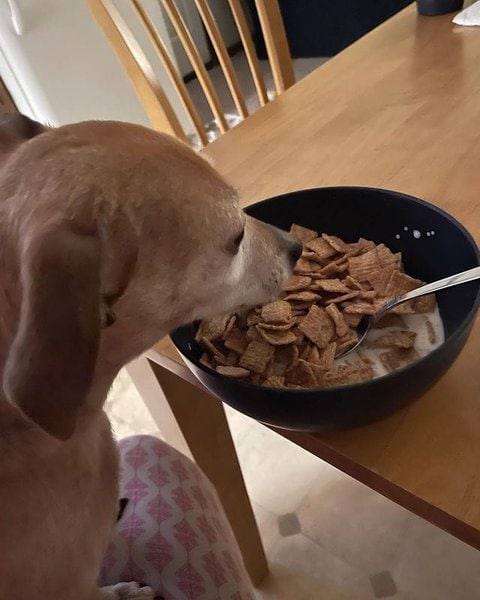
You can feed your dog cinnamon because it isn’t poisonous to dogs. However, excessive doses will bring about severe health problems, especially in little breed dogs.
Health Implications Of Each Ingredient To Your Dog
Although cinnamon is not poisonous to dogs, nutmeg, another ubiquitous baking spice, can be. In most baking recipes, nutmeg and cinnamon are frequently combined, and nutmeg contains the toxin myristicin.
There’s also butter, chocolate, and sugar in the ingredients for cinnamon toast. We discuss the health implication of each ingredient below.
Butter
Because butter is primarily fat, it isn’t healthy for your dog to eat in large amounts. But a small piece of buttered bread is acceptable for them to eat and shouldn’t hurt them right away. However, moderation is crucial to keeping your dog happy and healthy, as it is with any meal.
If your dog has ever had pancreatitis or needs a low-fat or low-salt diet, it’s best to avoid putting butter on their toasted treat. After all, it’s better to be safe than sorry, and the rule for most human foods for dogs is to keep it easy and uncomplicated to ensure that they’re safe to eat.
Chocolate
Dogs are poisoned by chocolate. Although it is rare, chocolate poisoning can be fatal as it can cause serious illnesses. It is poisonous because it contains theobromine, a chemical similar to caffeine.
The major toxin in chocolate, theobromine, is highly comparable to caffeine. In medicine, both compounds are employed as diuretics, heart stimulants, blood vessel dilators, and smooth muscle relaxants.
Theobromine and caffeine are not metabolized as well by dogs as they both are by humans. Consequently, dogs are more susceptible to the impacts of toxins.
Nutmeg
Nutmeg includes a toxin called myristicin, which is present in the seed oil and can be extremely hazardous to dogs if consumed significantly.
Although a bit of nutmeg in a dish is unlikely to cause significant toxicity, it can induce stomach irritation, so it’s better to avoid feeding your dog this ingredient entirely.
If you suspect your canine buddy has gotten into the spice cabinet, remember to keep nutmeg and nutmeg-containing baked items out of your dog’s reach.
Sugar
Dogs, like people, require sugar in the form of carbohydrates; however, do not feed your rover granulated sugar and avoid sweets.
However, granulated sugar, whether in the form of a cube or a cookie, is not suitable for your dog. Cavities, weight gain, metabolic disorders, and diabetes are all risks for dogs who eat a lot of granulated sugar. As a result, it’s usually preferable to avoid sugar!
Why Is Cinnamon Bad To Dogs?
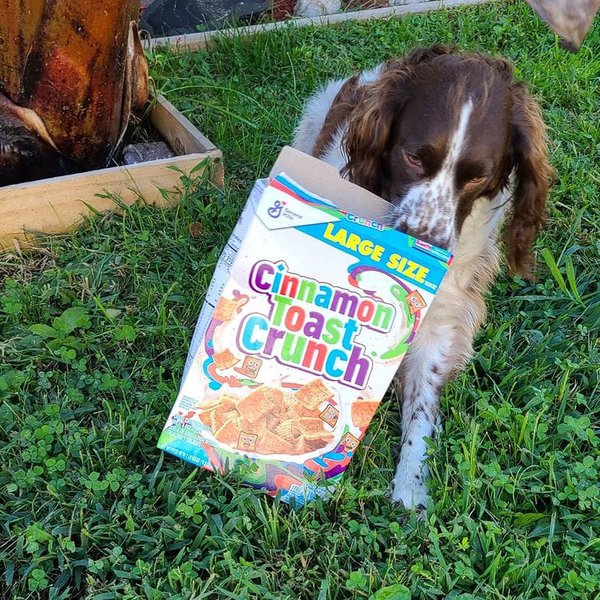
While cinnamon may not be hazardous to dogs, the same dog treat is likely to contain numerous other additives that are bad.
Cinnamon isn’t poisonous to dogs, but excessive doses might induce vomiting, diarrhea, and other digestive problems. This is especially true for small dog breeds that consume a lot of cinnamon in a single sitting.
When it comes to your dog’s health and safety, it’s best to err on the side of caution. If your dog feeds on a significant amount of cinnamon, you should consult your veterinarian as soon as possible.
Cinnamon is available in a variety of forms including oils, powders, sticks, and even in baked goods. Hence, before you give your dog a slice of that cookie, be sure you know what ingredients are exactly in it.
Even though your pooch will not die from too much cinnamon, it will irritate his lips and throat. It’s also possible that cinnamon will cause an allergic reaction in your dog.
Also, excessive cinnamon can induce diarrhea, vomiting, low blood sugar, and even illnesses like liver disease and heart rate alterations.
It may take more than one teaspoon of cinnamon to produce problems in your dog, especially in large breed dogs, but if you have a smaller dog or puppy, even less than a teaspoon of cinnamon could be dangerous.
Of course, because every dog is different, yours may be more sensitive to cinnamon than other dogs. Always exercise caution and keep a watch on your doggo if it comes into contact with cinnamon.
Another thing to keep in mind is that your furry friend does not have to swallow cinnamon before developing problems. When your doggie’s skin comes in contact with cinnamon essential oil or cinnamon potpourri, it may have certain sensitivities. As a result, keep in mind when putting out your autumn decorations and scents.
Can Dogs Eat Treats With Cinnamon?
Cinnamon is safe for dogs if only a small amount is incorporated into their diet or treats.
Can Dogs Combine Cinnamon With Other Food?
Yes. In fact, you should never give cinnamon alone to your dog. It irritates their tongue and throat, causing them to cough or choke.
Cinnamon is safe for your dog to eat in moderation, and this amazing ingredient will surely spice up any dog-friendly biscuits you create for them. It’s great to use cinnamon as a pleasant flavor in your dog’s food, but if you want your dog to get the same health benefits as humans, you should start looking at his real dinner.
In the worst-case scenario, too much cinnamon might harm your dog’s blood pressure and liver. However, it would have to eat a lot of cinnamon to have such terrible consequences. As long as you use it sparingly and always combine it with other foods, your furry buddy should be fine.
If you wish to offer cinnamon to your pooch as a supplement, talk to your veterinarian about the potential hazards and advantages. In the interim, look into alternative supplements that have been shown to aid your dog.
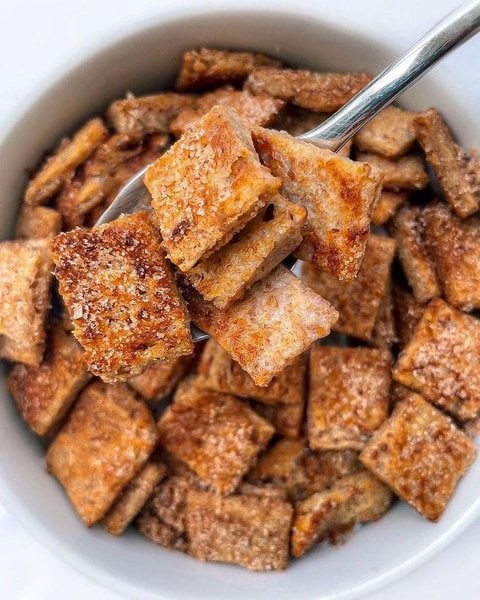
Can A Limited Quantity Of Cinnamon Hurt Dogs?
Of course, you don’t want to serve your canine companion table scraps or foods containing a lot of cinnamon since this may cause an upset stomach in your dog.
Like many other treats, cinnamon should be used in moderation to keep your dog happy and healthy. If they consume too much cinnamon, it can induce gastrointestinal distress, such as vomiting, diarrhea, and respiratory problems.
While essential oils might cause problems at lower doses, Most canines require more than one teaspoon of powder to create difficulties.
Small breed dogs may be more sensitive to cinnamon than large breed dogs. A large cinnamon overdose can cause vomiting, diarrhea, changes in heart rhythm, low blood sugar, and liver illness.
Are There Alternatives To Cinnamon Crunch Toast?
Of course! Pet Plate is one dog food that we recommend all the time to dog owners. It is low in sugar, rich in fiber, and 100% organic. It is a fine or the perfect replacement for cereals that you can feed your dog!
Not only can humans enjoy several kinds of cereal, but dogs can also enjoy them too. Some cereals other than Cinnamon Toast Crunch are good for your rover. The issue is in identifying these cereal types. You will learn about them in the next section.
What Cereals Can Dogs Eat?
A few bowls of cereal are not only safe for dogs, but they can also be tasty and healthy choices for them.
Plain Cheerios, Bran Flakes, and Rice Krispies are a few examples of alternatives to Cinnamon Toast Crunch.
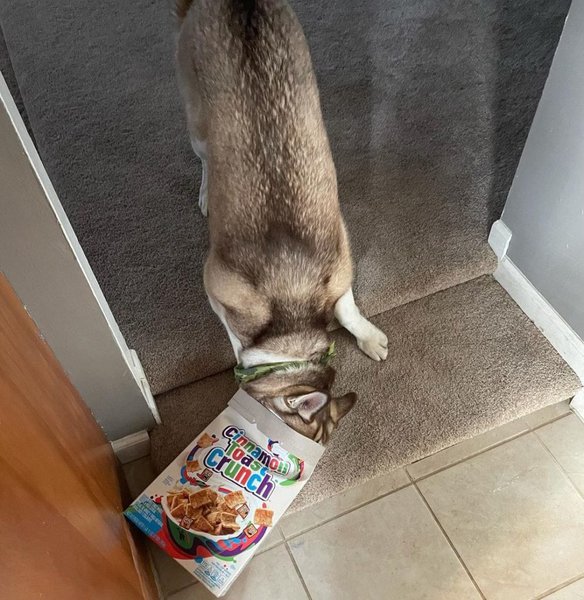
Cereal Cheerios
Cheerios are safe to feed to your dog. However, because they have no nutritional value and are simply empty calories, they should only be used as a treat rather than a meal replacement.
Cheerios are also used as a training treat by some dog owners because they are small and easy to eat during a training session.
Chex Cereal
Rice Chex and Corn Chex cereals do not do much good to dogs due to their low nutrient value. Corn and rice are common fillers in dog diets, so as long as your dog doesn’t have an allergy to any of those components, you should be fine sharing a few pieces.
Corn Flakes
As long as your furry friend does not have an allergy to corn or maize, Corn Flakes are good for him. Corn Flakes have a lower sugar content than many other cereal brands, but they are still full of empty calories and carbs.
Frosted Flakes
Frosted Flakes are theoretically healthy and non-toxic for dogs, but they should not be your go-to cereal for a treat. If you do this, use only a few flakes and sparingly. There are healthier cereal options available that will not irritate your dog’s tummy due to sugar.
Oat Bran Cereal
Oat Bran is not just safe for dogs, but it is also one of the few kinds of cereal that provides them with some nutrition. Oat Bran contains a high amount of fiber, which can aid with weight loss and digestion. However, your dog’s daily dog food should already have enough fiber, so adding extra isn’t necessary.
Is Oatmeal Good For Dogs?
Yes, oatmeal is safe and beneficial for your furry buddy! But keep in mind a few points. Begin by merely feeding it as a snack, not a meal or every day. Second, offer your dog plain oats with water instead of milk. Third, only give your dog cooked oatmeal, not raw.
Oatmeal is a nutrient-dense food for humans and dogs. It’s high in fiber, which helps bowel movements and blood sugar levels. You may give your dog a healthy dose of vitamins, minerals, and antioxidants.
It’s a great carbohydrate option for dogs that are intolerant to wheat or grains. Oatmeal contains vitamin B, which helps your dog’s coat, and linoleic acid, which helps your dog’s skin.

